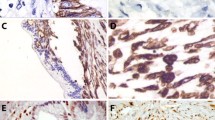Abstract
CIP2A has been regarded as a novel potential therapeutic target for multiple cancers. The aim of this study was to detect CIP2A expression in pancreatic ductal adenocarcinoma (PDA) and to analyze its association with prognosis of PDA patients. The expression of CIP2A and three epithelial–mesenchymal transition (EMT)-related proteins (E-cadherin, N-cadherin, and vimentin) was examined in 96 PDA tissue samples by immunohistochemistry. Fifty-four cases (56.3 %) were defined as positive for CIP2A expression. Immunohistochemistry showed that CIP2A expression was correlated with poor tumor differentiation, TNM stage, and lymph node metastasis. Kaplan–Meier survival analysis showed that patients with CIP2A-positive expression showed lower overall survival rate than those with CIP2A-negative expression. Multivariate analysis showed that CIP2A expression was an independent prognostic factor for PDA patients. Furthermore, positive expression of CIP2A was strongly associated with loss of the epithelial marker E-cadherin and acquisition of the expression of the mesenchymal markers N-cadherin and vimentin. These findings suggest that CIP2A might promote EMT and progression in PDA, and thus may be a potential therapeutic target for patients with PDA.


Similar content being viewed by others
References
Hingorani SR. Location, location, location: precursors and prognoses for pancreatic cancer. Gastroenterology. 2007;133:345–50.
Lockhart AC, Rothenberg ML, Berlin JD. Treatment for pancreatic cancer: current therapy and continued progress. Gastroenterology. 2005;128:1642–54.
Jemal A, Siegel R, Xu J, Ward E. Cancer statistics, 2010. CA Cancer J Clin. 2010;60:277–300. doi:10.3322/caac.20073.
Sharma C, Eltawil KM, Renfrew PD, Walsh MJ, Molinari M. Advances in diagnosis, treatment and palliation of pancreatic carcinoma: 1990–2010. World J Gastroenterol. 2011;17:867–97. doi:10.3748/wjg.v17.i7.867.
Farrow B, Berger DH, Rowley D. Tumor-derived pancreatic stellate cells promote pancreatic cancer cell invasion through release of thrombospondin-2. J Surg Res. 2009;156:155–60. doi:10.1016/j.jss.2009.03.040.
Junttila MR, Puustinen P, Niemelä M, Ahola R, Arnold H, Böttzauw T, et al. CIP2A inhibits PP2A in human malignancies. Cell. 2007;130:51–62.
Basile JR, Czerninski R. The role of CIP2A in oral squamous cell carcinoma. Cancer Biol Ther. 2010;10:700–2. doi:10.4161/cbt.10.7.13151.
Côme C, Laine A, Chanrion M, Edgren H, Mattila E, Liu X, et al. CIP2A is associated with human breast cancer aggressivity. Clin Cancer Res. 2009;15:5092–100. doi:10.1158/1078-0432.CCR-08-3283.
Huang LP, Adelson ME, Mordechai E, Trama JP. CIP2A expression is elevated in cervical cancer. Cancer Biomark. 2010–2011;8:309–17. doi: 10.3233/CBM-2011-0220
Li W, Ge Z, Liu C, Liu Z, Björkholm M, Jia J, et al. CIP2A is overexpressed in gastric cancer and its depletion leads to impaired clonogenicity, senescence, or differentiation of tumor cells. Clin Cancer Res. 2008;14:3722–8. doi:10.1158/1078-0432.CCR-07-4137.
Vaarala MH, Väisänen MR, Ristimäki A. CIP2A expression is increased in prostate cancer. J Exp Clin Cancer Res. 2010;29:136. doi:10.1186/1756-9966-29-136.
Huang LP, Savoly D, Sidi AA, Adelson ME, Mordechai E, Trama JP. CIP2A protein expression in high-grade, high-stage bladder cancer. Cancer Med. 2012;1(1):76–81. doi:10.1002/cam4.15.
Xue Y, Wu G, Wang X, Zou X, Zhang G, Xiao R, et al. CIP2A is a predictor of survival and a novel therapeutic target in bladder urothelial cell carcinoma. Med Oncol. 2013;30(1):406. doi:10.1007/s12032-012-0406-6.
He H, Wu G, Li W, Cao Y, Liu Y. CIP2A is highly expressed in hepatocellular carcinoma and predicts poor prognosis. Diagn Mol Pathol. 2012;21:143–9. doi:10.1097/PDM.0b013e318249fd8b.
Ren J, Li W, Yan L, Jiao W, Tian S, Li D, et al. Expression of CIP2A in renal cell carcinomas correlates with tumour invasion, metastasis and patients' survival. Br J Cancer. 2011;105:1905–11. doi:10.1038/bjc.2011.492.
Sobin LH, Wittekind CH. TNM classification of malignant tumours. 6th ed. New York: Wiley-Liss; 2002. p. 199–202.
Kelly K, Crowley J, Bunn Jr PA, Presant CA, Grevstad PK, Moinpour CM, et al. Randomized phase III trial of paclitaxel plus carboplatin versus vinorelbine plus cisplatin in the treatment of patients with advanced non-small-cell lung cancer: a Southwest Oncology Group trial. J Clin Oncol. 2001;19:3210–8.
Hennessy BT, Hanrahan EO, Daly PA. Non-Hodgkin lymphoma: an update. Lancet Oncol. 2004;5:341–53.
Conflicts of interest
None
Author information
Authors and Affiliations
Corresponding author
Rights and permissions
About this article
Cite this article
Wang, L., Gu, F., Ma, N. et al. CIP2A expression is associated with altered expression of epithelial–mesenchymal transition markers and predictive of poor prognosis in pancreatic ductal adenocarcinoma. Tumor Biol. 34, 2309–2313 (2013). https://doi.org/10.1007/s13277-013-0775-2
Received:
Accepted:
Published:
Issue Date:
DOI: https://doi.org/10.1007/s13277-013-0775-2




